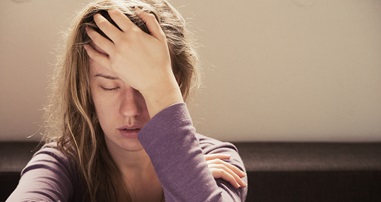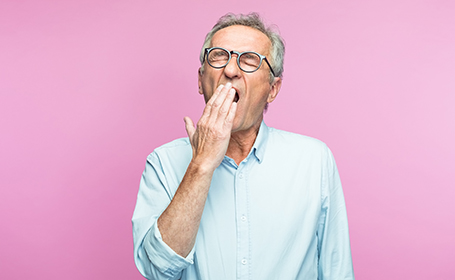
How to get through the day after a bad night's sleep
If you've had a bad night's sleep, facing the day can seem like a challenge. Consultant Psychiatrist and Sleep Specialist Dr Olga Runcie shares her nine top tips on getting through the day
1. Don't panic
After the occasional night of poor, broken or even non-existent sleep, you may well feel tired and irritable. But not sleeping at night every now and then won't harm your health in the long term. Many people catch up on a lack of sleep the following night.
So, don't panic, and stay optimistic. Everyone has a bad night's sleep now and then. Treat it as 'just a bad night' and don't dwell on it. Humans have good resilience to occasional sleep loss and your body will naturally compensate for it. It can also be difficult to fall asleep if you are worried about not sleeping and being tired throughout the day. The anxiety can become a cycle of worrying about getting no sleep and therefore not being able to drift off properly. So, as mentioned above, try your best not to worry after a night of no sleep.
2. Keep your body hydrated
If you wake up feeling tired in the morning, drink lots of water. We feel even more tired when our body is dehydrated, so start your day with a large glass of lukewarm water and carry on drinking regularly throughout the day. According to studies by Harvard Health, the average daily water for men is about 15.5 cups and for women about 11.5 cups. You will need more water if you exercise more throughout the day and need to sweat more. Drinking enough water has many benefits. It aids digestions, helps you normalise your blood pressure, and eases brain fog.
If you drink too much coffee throughout the day you will most likely struggle to sleep at night, so try to curb your caffeine intake as much as you can.
3. You can still drink coffee - but not too much
Caffeine, in moderation, can help to increase your alertness and give you an energy boost. A cup or two of tea or coffee in the morning can help you get through the day. However, it's important not to overuse caffeine. Two cups of coffee will give you about as much alertness as you're going to get from it. Consuming more than this won't make you more alert, but it could make you feel anxious or jittery, causing sweating and heart palpitations. If you drink too much coffee throughout the day you will most likely struggle to sleep at night, so try to curb your caffeine intake as much as you can. If you love the taste of coffee, drink decaffeinated coffee, or swap the coffee for a tea substitute.
4. Avoid driving
If you have not slept well or did not sleep during the night, make sure that you think carefully about your ability to drive safely. Driving when you feel sleepy is dangerous and can lead to accidents.
Be particularly careful when driving in the early afternoon.
Most people naturally experience a dip in concentration and attention at around 1-2PM. If you're sleep deprived, this dip will be more significant. For your own safety and safety of the others stay off the road as much as possible if you haven't slept. Use public transport, taxis or ask a friend for a lift.
5. Don't rely on sugar
When you are sleep deprived, you may feel more hungry than usual and might be tempted to reach for high calorie snacks made from simple carbohydrates. However, while the sugar in these snacks will give you a quick energy boost, it won't last long.
The brief energy high after we eat sugar and other simple carbohydrates - often known as a 'sugar rush' - can result in a subsequent 'crash' due to a rapid decline in blood sugar levels. You could end up feeling even more tired.
It's best to avoid large meals, sugary foods and energy drinks completely. Stick to a balanced and healthy diet and put extra emphasis on protein-rich foods such as nuts and lean meats.

6. Simplify your day
After a bad night's sleep, your energy levels will be compromised and you will not be at your best. So, take it easy the next day. Change things up and lighten your workload as much as possible. If you had five or six tasks for the day, consider cutting them down to two or three.
If you do fewer things, you should be able to focus on doing them to a high standard and you should hopefully find things less stressful.
Another important piece of advice is, do not make any big or significant decisions until you are well rested.
7. Go outside for a walk
By going outside for a walk, even a short one, you will expose your body to both natural light and physical activity. If you're at work, make sure your workspace is well lit and consider taking a walk at lunchtime.
Exposure to as much bright natural light as possible, especially right after waking up, will provide your body with natural cues to promote alertness and wakefulness. Light helps the body to block production of the sleep hormone melatonin. You'll get the benefits of natural light even on a grey, cloudy day.
Movement and physical activity also stimulate alertness. Even if you're feeling exhausted after poor or little sleep, it's important to keep active.
Keep your activity light or moderate and avoid vigorous exercise when you're exhausted. You are much more likely to be injured during exercise if you are sleepy or drowsy.
Take your nap in the middle of the day, between 12-2PM, to avoid a negative impact on your sleep cycle.
8. Take a power nap
It might help you keep focused if you take more breaks than normal during the day. Of course, you won't always be able to take a nap, but if you have the time and the ability and decide to take one, make sure that nap is brief.
Limit your nap to 20-30 minutes. Napping longer than that can actually make you drowsier than you already are. Take your nap in the middle of the day, between 12-2PM, to avoid a negative impact on your sleep cycle.
Please note, however, if you suffer from insomnia it is better to avoid taking a daytime nap completely.
9. Keep to your regular sleep schedule
You might be tempted to go to bed earlier and to sleep for longer than normal, but it's generally best to stick to your usual schedule. Going to bed too early and sleeping in can shift your normal sleep pattern.
No matter how tired you feel, there is no reason to sleep all day. Try to go to bed no more than an hour before your normal bedtime and get up no more than an hour later. You'll get the most recover you can from 10 hours of sleep and a longer sleep duration is not going to be more productive.
If you're regularly having a bad night's sleep
A bad night here and there is one thing, but when broken or troubled sleep becomes a regular occurrence, it can be a real problem.
After several sleepless nights, the negative physical and mental effects of sleep loss become more pronounced and more serious. If you feel your sleep difficulties are becoming chronic, causing you distress and affecting your wellbeing, consult a specialist. They can help you determine the best course of action to get you back to regular sleep patterns.
Get help for poor sleep with our sleep specialists
You can book an appointment with our sleep specialists to help monitor your sleep and tackle poor sleeping habits.
Tags
How do I book an appointment?
If you're concerned about symptoms you're experiencing or require further information on this subject, talk to a GP or see an expert consultant at your local Circle Hospital.
